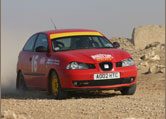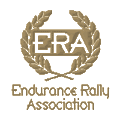The World Cup Rally Series
The first World Cup Rally was run in 1970, a ground-breaking long-distance marathon that linked up the Wembley football stadium, scene of England’s football glory in the World Cup soccer match of 1966, with the next soccer World Cup match in Mexico City – it was a resounding success and is still talked of as the toughest rally of all time. The winner was a Ford Escort with a 1600cc Cortina push-rod engine, and Ford then produced a special model called the “Escort Mexico”.
The second World Cup was held in 1974 in Munich, but rallycars went there via a double crossing of the Sahara Desert - the first time any rally had driven across the Sahara twice – the winner was a Citroen DS23, prepared by an Australian driver in his back-garden, which proved so reliable it won with no less than seven days of penalty points clear of the runner up, Christine Dacremont in a Peugeot 504.
In 2001 soccer’s world-governing body Fifa gave a licence for the Endurance Rally Association to use The World Cup Rally name and we revived the series with a long drive from London to Morocco and back again. Just like the two original World Cups of the 1970's it was for production-cars with limited modifications, only this time the engine size was capped at 1400cc, keeping costs, and overall speeds, within sensible limits. A VW Golf won the first World Cup Rally Revival, just pipping a works-prepared Peugeot 206 driven by Barbara Armstrong, former British ladies rally champion.
Several Manufacturers factories built works-cars for this new rallying concept - Peugeot, Skoda, Mercedes, Daihatsu, and MG factories all built and entered cars for the World Cup Rally revivals.
Leader Board from previous ERA World Cup Rallies
- Donie Keating / Nick Condon - Volkswagen Polo
- Barbara Armstrong / Alyson Marlow - Peugeot 206 LX
- David Johnson / Robert Johnson - Proton Satria
- Andy Dawe / Simon Sparey - MG ZR
- Larry Davis / David Wright - Saab 96 V4
- Paul Carter / Geoff Dearing - Vauxhall Nova
- Shirley Greenway / Andrew Johnson - MG ZR
- Richard Butler / Tobin Gordon - Renault Clio
- Andrew Actman / Tom Coulthard - MG Midget
- Nicky Porter / Malcolm Sinclair - Mitsubishi Spacestar
- Alastair Caldwell / Gill Cotton - Peugeot 205 Rallye
- Michael Darcey / Steve Hutchinson - MG ZR
- David Johnson / Nigel Banks - Proton Satria
- Paul Merryweather / Sandra Deacon - Peugeot 205 Rallye
- Tristan Hillgarth / Antonio Morales - BMW Mini Cooper
- Roger Stevens / Michael Stevens - Seat Ibiza
- Andrew Actman / James Wheildon - Daihatsu Sirion
- Les Harrogate / Darren Ray - Proton Compact
- Johnathan Langhorne / Mark Sayer - Rover 214i
- Charlie Campey / Faye Campey - Vauxhall Nova
- Nicky Porter / Malcolm Sinclair - Mitsubishi Spacestar
- David Winstanley / Terri Metcalfe - MG ZR
- Sophie Robinson / Paul White - Volkswagen Polo
- David Maryon / Kenneth Powell - Peugeot 206
- Paul Heal / Mathew Heal - Proton Compact
- Stephen Cooper / Aggie Foster - Suzuki Swift
- Alastair Caldwell / Sarah Born - Peugeot 205 Rallye
- Robert Belcher / Jeremy Buckler - Volkswagen Polo
- Adrian Grinsted / Stuart Malpas - Rover 214i
- Felix Wright / John Hall - Ford Focus
- Alastair Caldwell / Brian Johnson - Peugeot 205 Rallye
- Richard Hayward / Kane Athay - Landrover Defender 110
- Dominic Manser / Jeremy Davies - Jeep Wrangler
- David Palmer / Jaqueline Palmer - Landrover Defender 90
- Tim Wheatley / Tony Leach - Landrover Discovery
- Martin Collins / Mark Potter - Nissan Patrol
- Anna McColl / Paul Clark - Landrover Defender 90
- Iain Freestone / Rod Maclean - Ford Escort Mk1
- Mike Thornton / Jeffrey Bechtel - Toyota Landcruiser
- Paul Kane / Mary Ellen Kane - Ford GT-350
After the running of several of these World Cup marathon rallies, the governing body of British motor-sport, the RAC Motor Sports Association, brought the concept to British clubmen with a new formula of low-cost rallying to be called Endurance Road Rallying, and Lombard returned to sponsor four international rallies driving a similar course to the original RAC Rallies around Britain. Today there is a national championship, with several events up and down the country, for cars to a similar specification to the pioneering World Cup revivals.

